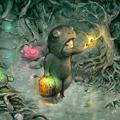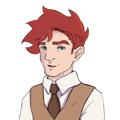Kelson Reads reviewed Parable of the Sower by Octavia E. Butler (Earthseed, #1)
Hard to put down. And hard to pick up again.
5 stars
It's certainly not a fun book, but it's extremely engaging, despite the bleakness of the slow-apocalypse setting and story.
What makes this apocalypse so horrifying, and the story so engaging, is how matter-of-fact Lauren is in describing everything in her diary. It's the world she grew up in, so it's normal to her, though she can see clearly even at 14 that it's unsustainable. There's a sharp generational divide between those who remember what things were like before, but all that is just history to her.
Lauren's present is hopeless and brutal, but her diary doesn't linger on the ever-present brutality like a horror novel would. She acknowledges it, of course, but she's focused on how to survive it so she can build something better.
The setting resonates so well today in part because the societal fears of the 1980s that Butler was extrapolating from are the same fears that …
It's certainly not a fun book, but it's extremely engaging, despite the bleakness of the slow-apocalypse setting and story.
What makes this apocalypse so horrifying, and the story so engaging, is how matter-of-fact Lauren is in describing everything in her diary. It's the world she grew up in, so it's normal to her, though she can see clearly even at 14 that it's unsustainable. There's a sharp generational divide between those who remember what things were like before, but all that is just history to her.
Lauren's present is hopeless and brutal, but her diary doesn't linger on the ever-present brutality like a horror novel would. She acknowledges it, of course, but she's focused on how to survive it so she can build something better.
The setting resonates so well today in part because the societal fears of the 1980s that Butler was extrapolating from are the same fears that have been re-stoked to create our modern political moment, and the problems she focused on remain unsolved. (I go into a bit more literary analysis on my website if you're interested in that sort of thing.)










